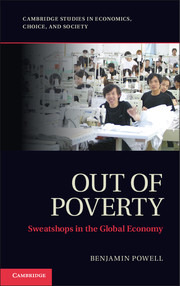Book contents
- Frontmatter
- Contents
- Figures
- Tables
- Acknowledgments
- Preface
- 1 Introduction
- 2 The Anti-Sweatshop Movement
- 3 The Economics of Sweatshop Wage Determination
- 4 Don’t Cry for Me, Kathie Lee
- 5 Health, Safety, and Working Conditions Laws
- 6 Save the Children?
- 7 Is It Ethical to Buy Sweatshop Products?
- 8 A History of Sweatshops, 1780–2010
- 9 The Process of Economic Development
- 10 What Good Can Activists Do?
- 11 Conclusion
- References
- About the Author
- Index
- References
8 - A History of Sweatshops, 1780–2010
Published online by Cambridge University Press: 05 June 2014
- Frontmatter
- Contents
- Figures
- Tables
- Acknowledgments
- Preface
- 1 Introduction
- 2 The Anti-Sweatshop Movement
- 3 The Economics of Sweatshop Wage Determination
- 4 Don’t Cry for Me, Kathie Lee
- 5 Health, Safety, and Working Conditions Laws
- 6 Save the Children?
- 7 Is It Ethical to Buy Sweatshop Products?
- 8 A History of Sweatshops, 1780–2010
- 9 The Process of Economic Development
- 10 What Good Can Activists Do?
- 11 Conclusion
- References
- About the Author
- Index
- References
Summary
Whenever I raise the point that it is immoral to shut us up in a close (sic) room twelve hours a day in the most monotonous and tedious of employment, I am told that we have come to the mills voluntarily and we can leave when we will. Voluntarily! . . . The whip which brings us to Lowell is necessity. We must have money; a father’s debts are to be paid, an aged mother to be supported, a brother’s ambition to be aided and so the factories are supplied. Is this to act from free will? Is this freedom? To my mind it is slavery.
These were the words, in 1845, of Sarah Bagley, who worked in Lowell, Massachusetts, and became the vice president of the Lowell Union of Associationists, a utopian reform organization. But they could easily be the words of an anti-sweatshop activist describing Third World sweatshops today.
Sweatshops are not new. They first appeared in Great Britain in the late eighteenth century and persisted there until the early twentieth century. In the United States, the first textile sweatshops appeared in the early nineteenth century in Rhode Island and Massachusetts. In fact, they flourished in the cities where I grew up and went to college. Lowell, Massachusetts and Lawrence, Massachusetts dominated the textile industry in the nineteenth century, and Haverhill, Massachusetts, my hometown, still has the nickname “the shoe city,” which it earned in the nineteenth and early twentieth centuries because of all the shoe factories located there. Virtually every wealthy country in the world had sweatshops at one point in their past. Sweatshops are an important stage in the process of economic development. As Jeffery Sachs, an economist and director of the Earth Institute at Columbia University, put it, “Sweatshops are the first rung on the ladder out of extreme poverty.” Let us examine what that rung was like in countries that are wealthy today.
- Type
- Chapter
- Information
- Out of PovertySweatshops in the Global Economy, pp. 112 - 126Publisher: Cambridge University PressPrint publication year: 2014



